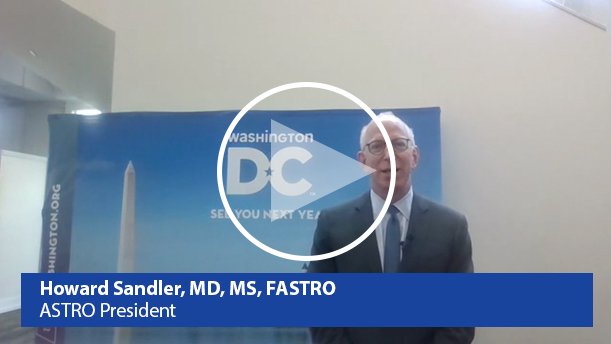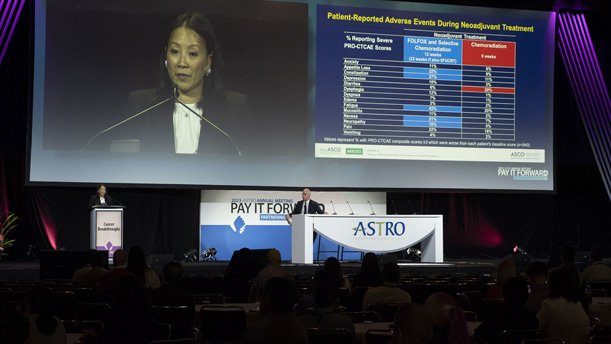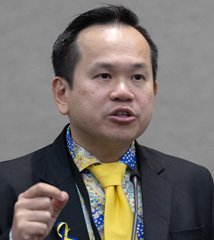| October 5, 2023 |

|
| |

|
|
AM Portal | Abstracts | Exhibits | onDemand | Daily News
|
| |
|
|

|
|
That’s a wrap! ASTRO 2023 concludes
Thank you to all our attendees, presenters and exhibitors for making ASTRO 2023 a huge success! From the science and education sessions to the more than 200 exhibitors, the excitement of the meeting was felt by all.
As a reminder, all in-person and virtual attendees have access to the meeting onDemand through June 2024 via the Annual Meeting Portal. The Virtual Poster Library with more than 1,600 posters will also be available online until June 2024.
Read the ASTRO Daily News to catch up on highlights and expert commentary from ASTRO’s 65th Annual Meeting. And, mark your calendar — we can’t wait to see you in Washington, DC, for the 66th Annual Meeting, September 29 – October 2, 2024!
|
|
| |
|
ASCO, AAPM present key takeaways in Cancer Breakthroughs session
|

|
|
In one of the Annual Meeting’s last but much anticipated sessions, Kimmie Ng, MD, MPH, Dana-Farber Cancer Institute, representing the American Society of Clinical Oncology (ASCO), and Kristy Brock, PhD, FASTRO, MD Anderson Cancer Center, representing the American Association of Physicists in Medicine (AAPM), presented important findings from the ASCO and AAPM annual meetings. ASTRO President Howard Sandler, MD, FASTRO, moderated. Read more.
|
|
| |

|
| |
|
Abstract highlights
Thank you to the volunteers from the ASTRO Communications Committee; Research Grants Evaluation Subcommittee; Science Education and Program Development Subcommittee; and Promoting Science Through Research and Training Committee for providing expert commentary on scientific presentations and abstracts provided in the Daily News each day during the Annual Meeting.
|
|
 |
Will Hormonal Therapy Intensification in the SRT Setting Lead to Important Outcome Improvements in Men with Higher-risk Prostate Cancer Features
Presenting author: Paul Nguyen, MD, FASTRO
Three large published randomized trials suggest a biochemical control benefit to adding hormonal therapy to salvage radiotherapy (SRT) for men with recurrent prostate cancer after radical prostatectomy. In the intact prostate setting, one large randomized trial has shown improvements in both MFS and OS in men receiving abiraterone acetate and prednisone in addition to GnRH agonist therapy in the context of patients with particularly aggressive disease features. A natural question is whether hormonal therapy intensification in the SRT setting may similarly lead to important outcome improvements in men with higher-risk features. This study was designed to answer just that. Read more.
|
|
 |
Radiotherapy for Metastatic Spinal Cord Compression with Increased Doses: Final Results of the RAMSES-01 Trial
Presenting author: Dirk Rades, MD, FASTRO
This presentation shared the results of a multicenter phase II trial — RAMSES-01 — on the use of dose escalated precision-radiotherapy (RT) delivering either 2.633 Gy X 15 or 2.333 Gy X 18 to favorable prognosis patients with metastatic spinal cord compression. The results were compared to a historical control group of favorable prognosis patients receiving 3 Gy X 10. The primary endpoint was local progression-free survival, which was defined as no deterioration of motor function during RT and no in-field recurrence of MSCC at 12 months. Read more.
|
|
 |
Is RFA or SBRT superior for patients with small renal masses?
Presenting Author: Anand Swaminath, MD
In the Randomized Pilot Trial of Stereotactic Body Radiation Therapy vs. Radiofrequency Ablation for the Management of Small Renal Masses (RADSTER) trial, patients who were deemed inoperable or declined surgery or surveillance were randomized to receive stereotactic body radiotherapy (SBRT) or radiofrequency ablation (RFA) at a tertiary center. Crossover was allowed if the assigned treatment could not be delivered. SBRT was delivered as a single fraction of 25 Gy, while RFA was conducted with two cycles of eight minutes each. Imaging by CT or MRI was conducted every three months, with diagnostic and one-year biopsies required. Read more.
|
|
| |
|
Congratulations to the 2023 Class of Fellows
|

|
|
Twenty-nine distinguished members of ASTRO have been named Fellows of ASTRO for their contributions to the Society through committee work, other volunteer service and to the field of radiation oncology in the areas of research, education, patient care or leadership. The Fellows were conferred in Tuesday’s Awards Ceremony.
|
|
| |
|
|
| |
|
Reminder: Claim your CME credits and complete the Meeting Experience Survey
|
|
AMA PRA Category 1 Credits™ are available for the in-person and virtual meetings and onDemand sessions. Credits can be claimed through June 1, 2024. Attendees can fill out the session evaluations and claim CME credits on the MyASTROApp.
CAMPEP credits are available for the in-person and virtual meetings, and MDCB credits are available for the in-person meeting only. CAMPEP and MDCB credits must be claimed by November 3, 2023.
Please watch for an email with your personalized link to the meeting experience survey. Your feedback will help us improve future meeting experiences.
And don’t forget, Annual Meeting onDemand content is available for in-person and virtual meeting attendees and can be accessed until June 1, 2024.
|
|
| |
|
|
| |
|
|





